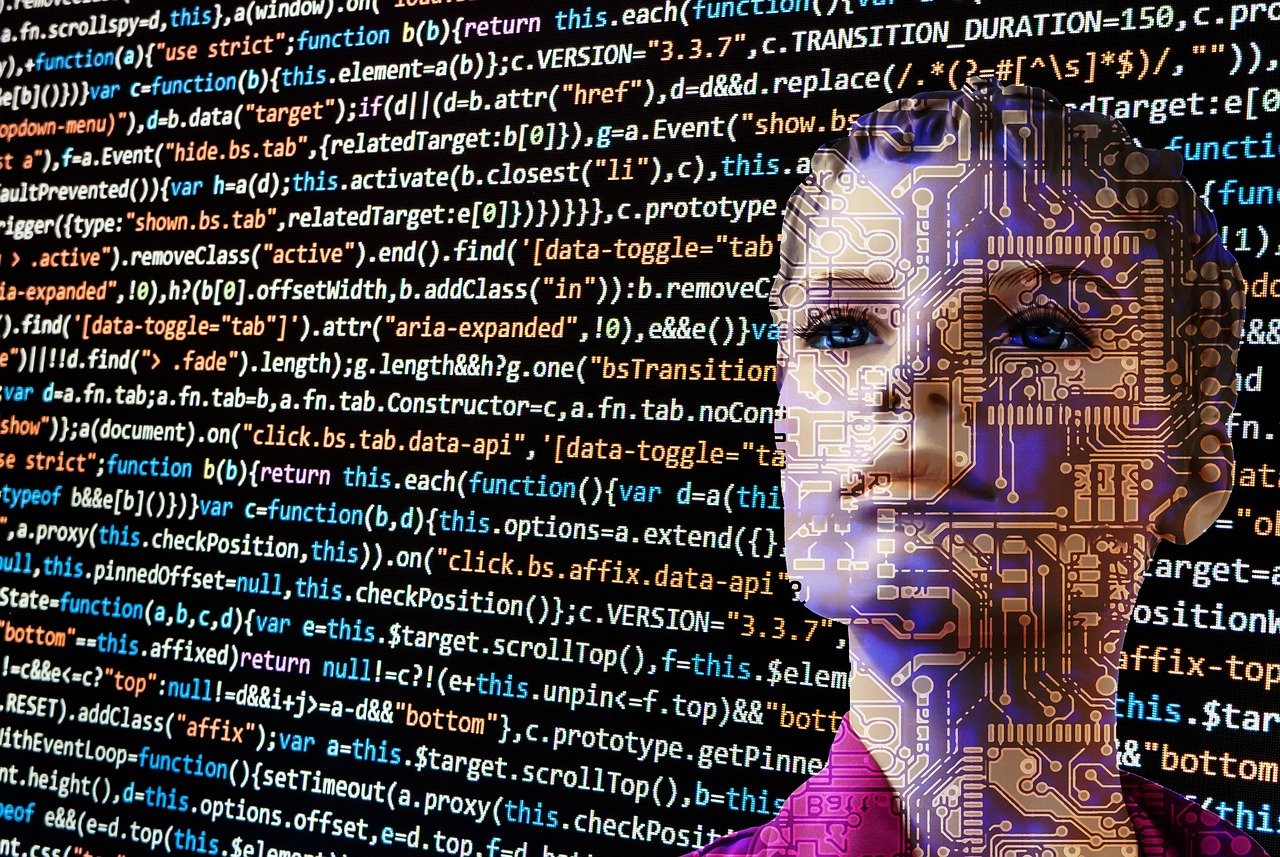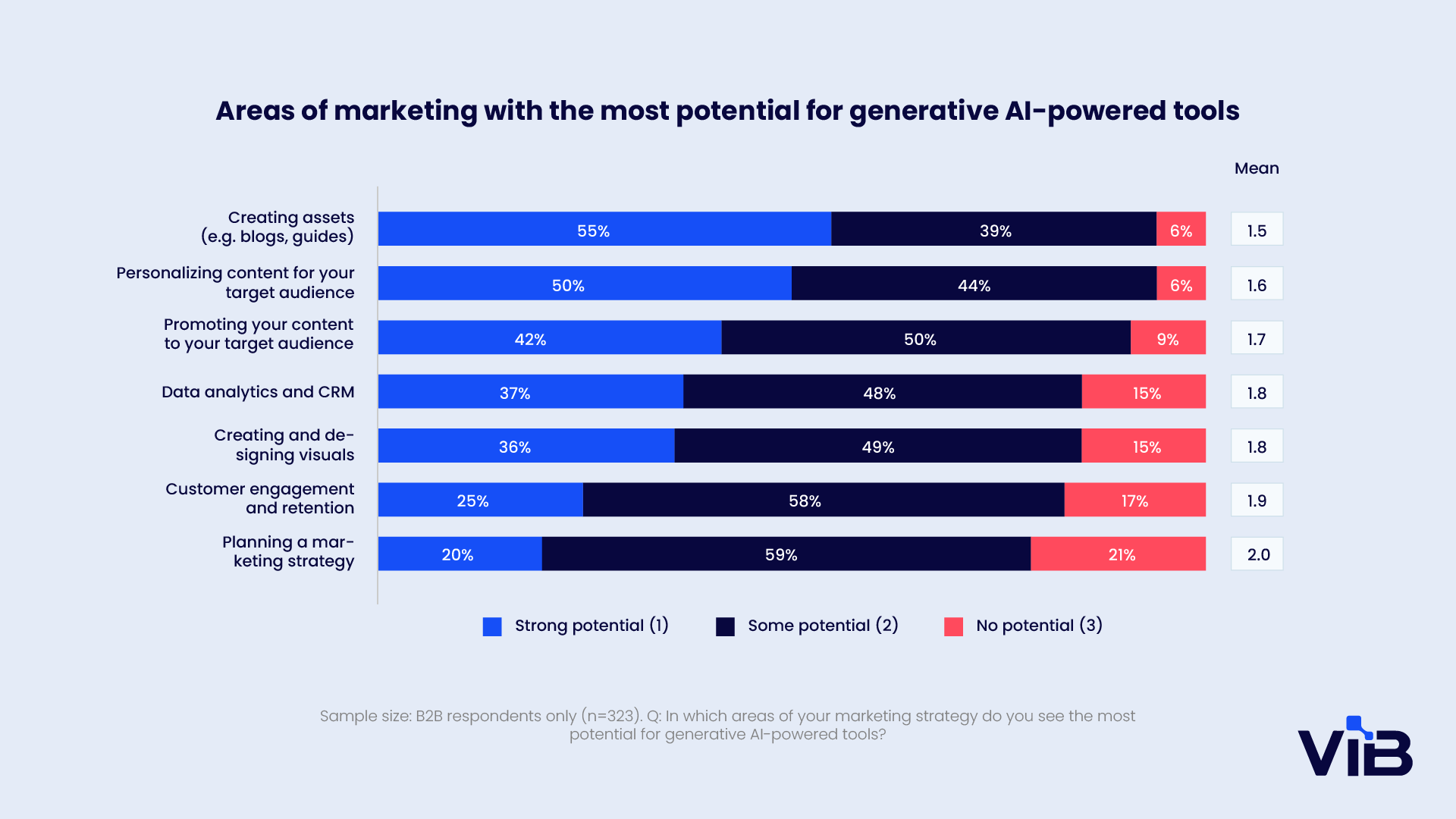
“Hey, ChatGPT, write me a blog!”
Just months ago, that wasn’t possible. Today, content creation has been one of the most common ways modern marketers have used ChatGPT. In fact, 85% of B2B marketers see generative AI as having a positive impact on marketing, according to ViB.
But how else can generative AI lend a hand to busy B2B marketers?
From enhancing CRM to personalizing content and maintaining brand consistency, Generative AI is reshaping the way businesses engage with their audience. Let’s dive into how Generative AI is ushering in a new era of efficiency and effectiveness with three practical tactics.
1 – Generative AI Streamlines Everyday CRM Tasks
By analyzing vast volumes of your unique customer data, Generative AI is a game-changer when it comes to customer relationship management (CRM) tasks, including lead management, content personalization, and reporting.
In other words, AI helps marketers create more personalized customer journeys, and track them more efficiently on their CRM.
One great AI tool that marketers can start using to tackle CRM tasks faster and more seamlessly is Hubspot’s Chatspot.
HubSpot’s Chatspot is a conversational CRM bot that helps sales, marketing, and service individuals to maximize their productivity. It helps generate follow-up emails, status updates, allows for prospecting, amongst other things.
For example, marketers can add new contacts by simply talking to the chatbot. Users can even ask Chatspot reporting prompts like “Show me a monthly summary of web visits for last year?”, or even forecasting prompts such as “List the deals closing this month with stage and forecasted revenue.” All these help business professions complete CRM- related tasks at a more efficient rate.
Through its ability to automate routine tasks and streamline processes, Generative AI is emerging as a powerful CRM assistant for B2B marketers to deliver a seamless and individualized experience, ultimately driving customer loyalty, retention, and overall business growth.
2 – Generative AI Helps Personalize Content at Scale
Generative AI not only saves time and resources by producing content quickly, but can also ensure that messaging resonates with audiences through personalization.
According to a recent B2B marketing trends report, 94% of B2B marketers see the the most potential for generative AI tools in personalizing content

For example, marketers can teach tools like ChatGPT about their different buyers, such as their various demographic traits, interests, and even real quotes or behaviors. By analyzing textual data and understanding context, ChatGPT can then discern unique language patterns, preferences, and behavior, and create a list of distinct buyer personas.
Through this analysis, ChatGPT can further generate personalized messaging, or even emails and blogs, that align with each persona’s specific challenges, goals, and more.
It’s that level of personalization that fosters stronger customer relationships and boosts engagement, which is “key to driving visitors, leads, and revenue” according to Hubspot. And with the help of AI, that level of personalization no longer needs to be tedious for B2B marketers.
Whether it’s a technical buyer seeking detailed specifications or a business-focused buyer looking for ROI insights, ChatGPT can adapt its communication to match the nuances of each persona, thus facilitating more meaningful interactions and engagement.
3 – Generative AI Assists In Enhancing Brand Consistency
Need to elevate brand consistency across team players, and to new heights? Generative AI can help.
By prompting AI tools with your branding and messaging guidelines, marketers can empower employees in their organization to create a cohesive and unified brand identity across various platforms and touchpoints. Whether it’s crafting social media posts, writing design briefs for marketing materials, or composing website copy, generative AI ensures that every piece of content exudes the brand’s essence.
All employees need is access to a company-wide AI tool to be able to generate all kinds of content, visuals, and messaging that align seamlessly with the brand’s core values, voice, and aesthetics. This not only saves valuable time but also minimizes the risk of human error, as AI’s output is more consistent.
In particular, ChatGPT has a new “custom instructions” feature which allows users to provide specific guidance or instructions to the AI model, directing it to generate content that aligns with their desired outcome.
When applied to brand-related tasks, the feature allows marketers and content creators to input guidelines that reflect the brand’s voice, style, and messaging. Subsequently, any output that uses the same guidelines remains consistent with the established brand identity.
For instance, a social media marketing team can use the custom instruction feature to craft social media captions that embody the brand’s unique personality. Likewise, a product marketing team can generate product descriptions that encapsulate the brand’s key selling points.
This personalized guidance helps prevent the AI from deviating into styles or tones that might not resonate with the brand’s audience, ultimately safeguarding the brand’s integrity and identity.
Especially with various distinct stakeholders using AI, setting up a standardized branded prompt is essential to ensure that AI-generated content aligns precisely with a brand’s desired identity, resulting in enhanced brand consistency across all communication channels.
Mastering a Balancing Act
As AI continues to stretch the potential of B2B marketing, it’s essential to remember the balancing act at play.
The marketer, whether they are a strategist, editor, or creative hand, is and will always be human. And so will the consumer. While tools like ChatGPT are making everyday tasks faster and easier, the heart of storytelling must remain human, to ensure genuine connections with our equally human readers.

